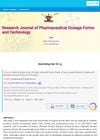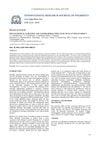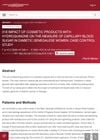 July 2024 in “International Journal of Molecular Sciences”
July 2024 in “International Journal of Molecular Sciences” Hemp seed biomaterials may reduce hair loss and improve hair growth.
[object Object]  March 2024 in “International journal of pharmaceutical and bio-medical science (Print)”
March 2024 in “International journal of pharmaceutical and bio-medical science (Print)” Angelica Sinensis and Chinese Arborvitae have various medicinal benefits, including anti-inflammatory and anti-cancer effects.
 March 2024 in “International journal of pharmaceutics. X”
March 2024 in “International journal of pharmaceutics. X” Spanlastic-laden nanogel could be a better way to deliver hair growth medication through the skin for treating hair loss.
February 2024 in “Cosmetics” The conclusion is that new plant-based treatments for hair loss may work by targeting certain enzymes.
 January 2024 in “Journal of lipid research”
January 2024 in “Journal of lipid research” Finasteride may lower cholesterol and slow heart disease progression.
 January 2024 in “Deleted Journal”
January 2024 in “Deleted Journal” Thuja plants have medicinal properties and potential for developing new therapies.
 January 2024 in “Journal of Ayurveda and integrative medicine”
January 2024 in “Journal of Ayurveda and integrative medicine” Millets may help reduce chemotherapy side effects like nausea, fatigue, and hair loss.
 November 2023 in “Research Journal of Pharmaceutical Dosage Forms and Technology”
November 2023 in “Research Journal of Pharmaceutical Dosage Forms and Technology” The herbal hair oil significantly promotes hair growth.
 October 2023 in “Current Issues in Molecular Biology”
October 2023 in “Current Issues in Molecular Biology” The YH complex, made from Astragalus membranaceus and Cinnamomum cassia, may help treat hair loss by promoting hair growth and follicle development.
 August 2023 in “Journal of Education, Health and Sport”
August 2023 in “Journal of Education, Health and Sport” Combining conventional and Chinese herbal medicine could help treat some skin and hormone-related diseases.
 August 2023 in “MOJ women's health”
August 2023 in “MOJ women's health” Brown Adipose Tissue (BAT) could potentially treat Polycystic Ovary Syndrome (PCOS) by controlling energy balance and lipid homeostasis, but more human research is needed.
[object Object]  April 2023 in “Clinical Chemistry and Laboratory Medicine”
April 2023 in “Clinical Chemistry and Laboratory Medicine” The document concludes that inflammation markers can be used in diabetes, vitamin D3 affects immune pathways, hyperthyroidism changes hormone levels, androgen levels help diagnose Adrenocortical Carcinoma, erectile dysfunction is linked to diabetes, hypogonadism is common in HIV-infected males, and hormones can be biomarkers for various conditions.
 November 2022 in “Arab Gulf Journal of Scientific Research”
November 2022 in “Arab Gulf Journal of Scientific Research” Taurine is important for many body functions and its deficiency can cause health problems.
 September 2022 in “Frontiers in Bioengineering and Biotechnology”
September 2022 in “Frontiers in Bioengineering and Biotechnology” Taxifolin from Rhododendron mucronulatum may help prevent hair loss and promote hair growth.
 September 2022 in “Biomedicines”
September 2022 in “Biomedicines” Lipid Accumulation Product and Free Androgens Index are effective for assessing fatty liver disease risk in women with Polycystic Ovary Syndrome.
 July 2022 in “International Journal of Applied Pharmaceutics”
July 2022 in “International Journal of Applied Pharmaceutics” Machine learning and deep learning can effectively diagnose alopecia areata.

There are many ways to treat Polycystic Ovary Syndrome, including lifestyle changes, surgery, and various medications, but more research is needed for better treatments.
 February 2022 in “Mediators of Inflammation”
February 2022 in “Mediators of Inflammation” Women with Polycystic Ovary Syndrome (PCOS) have lower levels of a substance called DIAPH1 in their blood, which is linked to changes in sugar metabolism and insulin resistance.
 January 2022 in “IntechOpen eBooks”
January 2022 in “IntechOpen eBooks” Some lesser-known causes of PCOS include autoimmune issues, genetic mutations, and changes in the body's microbiome.
November 2020 in “IntechOpen eBooks” Not getting enough minerals can lead to health problems and shorter lifespans.
December 2022 in “Scientific Reports” Compound 4 is a promising treatment for hair loss with low toxicity.
November 2022 in “International Journal of Applied Pharmaceutics” Ergostadienol from Moringa seed oil may help prevent hair loss.
Sansevieria trifasciata Prain shows promise for treating hair loss by inhibiting androgen receptors.
 4 citations,
September 2017 in “International research journal of pharmacy”
4 citations,
September 2017 in “International research journal of pharmacy” Banana bract extract might treat bacterial infections and help reduce waste.
 73 citations,
March 2010 in “Food and Chemical Toxicology”
73 citations,
March 2010 in “Food and Chemical Toxicology” Zizyphus jujuba essential oil can promote hair growth.
 66 citations,
December 2003 in “Endocrinology and Metabolism Clinics of North America”
66 citations,
December 2003 in “Endocrinology and Metabolism Clinics of North America” Doctors need to be better prepared to assess and treat obesity in patients.

Diet and supplements can significantly affect acne, with some foods and nutrients reducing and others worsening it.
 October 2017 in “Journal of Investigative Dermatology Symposium Proceedings”
October 2017 in “Journal of Investigative Dermatology Symposium Proceedings” Using lidocaine before keloid injections makes the treatment more comfortable for patients.
 March 2023 in “International Journal of Advanced Research in Science, Communication and Technology”
March 2023 in “International Journal of Advanced Research in Science, Communication and Technology” Various medicinal plants like Polygonum multiflorum, Red ginseng extract, and Zizyphus jujuba can potentially treat hair loss, offering benefits like low cost and multiple ways of working. Other effective natural substances include Pygeum africanum, Seneroa, Urtica dioica, and more.
 September 2017 in “Journal of Investigative Dermatology Symposium Proceedings”
September 2017 in “Journal of Investigative Dermatology Symposium Proceedings” Using skin lightening products with hydroquinone can increase blood sugar levels in diabetic women.

























